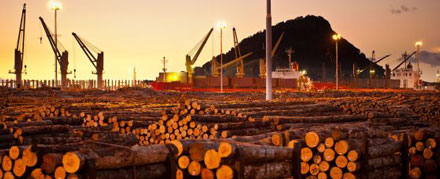
Exposure to a gas being used on an industrial scale at Port of Tauranga doubles the risk of contracting motor neurone disease, new research has found. Source: New Zealand Herald
The revelation comes days before a public meeting will air concerns that using the methyl bromide gas to fumigate logs at the port may pose a health hazard to people in surrounding areas.
An investigation by the Centre for Public Health Research, which is yet to be published, involved surveying 300 people with the deadly disease and comparing them with a control group of 600 other people from around the country.
Researcher Grace Chen said preliminary findings showed that exposure to methyl bromide “doubled the risk” of contracting the disease.
Methyl Bromide was thrust into the limelight last week when the Bay of Plenty Times revealed that the Environment Court had found what it described as “worrying” levels of the gas at the Port of Tauranga boundary during operations to fumigate logs.
Fumigator Genera said that the measurements were unreliable, but the court nevertheless described the health effects of the gas as “chilling” and barred rival company Envirofume from using it at the port.
Ms Chen said the data was yet to be fully analysed but had already “definitely” shown that “methyl bromide exposure increases the risk” of having motor neurone disease.
Genera has pledged to filter methyl bromide at the port by 2019, phasing out an existing method in which most of the gas is released into the air after fumigating logs under tarpaulins.
The new method is intended to neutralise the gas to create inert waste such as salts.
Envirofume’s managing director, Garry Hilton, said his company had intended to use a method offering “vast improvements for worker and public health and safety” over current systems by diluting methyl bromide with the air at a ratio of more than 1000 to one.
The court had ruled against this plan “despite fumigation being an existing and continuing activity at the Port of Tauranga”.
This was “a great shame” as it was “a much-needed opportunity for improvement”.
Mr Hilton said a target to recapture 15% of the gas used at the port was not met last year.
“I consider there to be a lot of room for improvement in fumigation practices – particularly around the health and safety of port workers and the public,” Mr Hilton said.
Meanwhile, Green MP Steffan Browning has called a public meeting in Tauranga to discuss the issue.
Mr Browning said the ports in Tauranga, Whangarei and Napier were “carrying the burden” of methyl bromide fumigation.
Fumigators at other ports, including Wellington, recaptured the gas after use so that it could not escape into surrounding areas.
Mr Browning called for a new facility to be built at the port that would allow safer fumigation.
“If it’s not methyl bromide it will be something else, so we need recapture,” he said. “It can’t go on like it is.”





